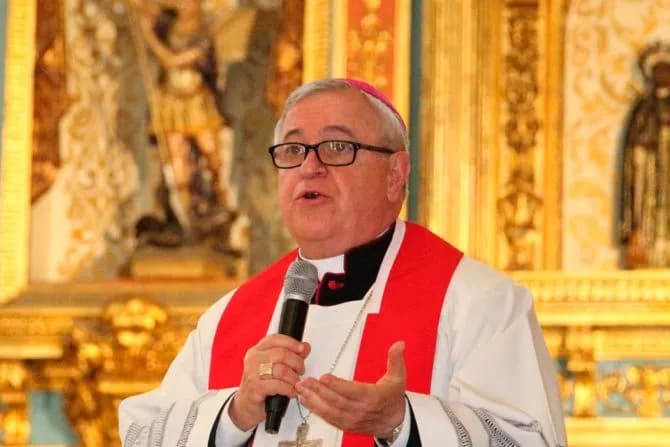ROME – Amid an ongoing investigation into a scandal-plagued Peruvian lay group, the Vatican Tuesday announced that a top archbishop belonging to the group has resigned from leadership of the Piura archdiocese.
According to an April 2 Vatican news bulletin, Archbishop José Antonio Eguren Anselmi of Piura, 67 and a member of the Sodalitium Christinae Vitae (SCV), stepped down from leadership of his diocese.
Eguren’s exit comes amid an ongoing Vatican investigation into the SCV, a society of apostolic life founded by Peruvian layman Luis Fernando Figari in the 1970s.
RELATED: Vatican investigators meet Peru prelate accused of land trafficking
Though allegations were made several years prior, scandals involving the SCV exploded in 2015, when Peruvian journalists Pedro Salinas and Paola Ugaz published their book Half Monks, Half Soldiers detailing years of alleged sexual, physical and psychological abuse by top members of the SCV.
Figari himself was accused of physical, psychological, and sexual abuse within the community, including sexual abuse of minors. In 2017 he was sanctioned by the Vatican and prohibited from having further contact with members of the group, and, after losing two appeals, he is currently living in exile.
After several failed attempts at reform, including with papally-appointed external leadership, Pope Francis asked that a formal inquiry into the SCV be launched and tapped his top two investigators, Maltese Archbishop Charles Scicluna and Spanish Monsignor Jordi Bertomeu, to oversee the process.
Together, Scicluna and Bertomeu traveled to Peru in late July-early August last year, where they met with SCV victims and leadership, as well as others involved in the case, including Eguren.
Eguren has been a key source of interest since the beginning of the SCV saga, finding himself at the center of corruption allegations in Piura and as the instigator of a legal campaign against Ugaz and Salinas for their reporting.
In 2018, Eguren infamously slapped both Salinas and Ugaz with criminal defamation suits related to their reporting, specifically citing investigative reports in which they named him as not only complicit in the SCV’s abuses and coverup efforts, but also land trafficking.
(In the Peruvian system, private citizens can register a criminal complaint for defamation.)
Pope Francis met Eguren, who until Tuesday had led the Archdiocese of Piura since 2006, in a private audience at the Vatican in September 2018. The Vatican never disclosed the nature of the meeting, but it is widely believed that Eguren’s criminal suits against Salinas and Ugaz were at least part of the motivation.
A year later, shortly after winning his case against Salinas, Eguren retracted his complaints against both journalists amid an avalanche of public, media, and ecclesial backlash, including a statement from the Peruvian bishops condemning his actions and in which they claimed to have the pope’s backing.
Eguren met Pope Francis at the Vatican again in March 2022, as Ugaz was publishing further reports on land trafficking in the Piura area by organizations associated with the SCV.
Among the items cited in Eguren’s original complaint against Ugaz were her allegations of criminal activity in the purchase of a large patch of land in Piura by the San Juan Bautista Civil Association and involvement with the criminal group La Gran Cruz.
For years, a legal battle has been unfolding in Piura between a group of farmers and a handful of companies either operated by or with ties to the SCV, including the San Juan Bautista Civil Association, the Empresa Agrícola Santa Regina SAC, and the Inversiones San Jose.
It is common throughout much of Latin America for peasants and members of the poorer classes to establish roots on a patch of inexpensive land and live there undisturbed for decades, or even hundreds of years, while having no formal title to the land on which they live, usually due to a lack of money or legal support.
Often, companies who want to buy up the land will strike a deal with the titleholder and effectively run the inhabitants out of town through threats and intimidation, at times resorting to violence carried out by criminal groups.
In the province of Piura, one of these communities is a group of farmers in the town of Catacaos who are battling both threats from criminal groups and legal suits by companies of the SCV who wish to buy up the land they occupy.
Since 2012, leaders of the Catacaos community have been complaining about harassment and violence from companies associated with the SCV.
Given the authority he has held in the region and within the SCV, Eguren has been at the center of many of the accusations and has been accused of being an architect of various schemes to oust the farmers from their land.
As part of their inquiry last summer, Scicluna and Bertomeu while in Lima met with a group of peasant farmers from the San Juan Bautista of Catacaos rural community in Piura to discuss the situation and the allegations against the SCV.
They were joined by Jennie Dador, executive secretary of the National Coordinator of Human Rights (CNDDHH) in Peru. Later that same day, Scicluna and Bertomeu met with Eguren.
RELATED: Vatican ‘007’ back in Peru to continue probe of scandal-plagued groups
Eguren’s departure from Piura is likely to be seen as a significant blow to the SCV, coming after the Vatican sent out a series of disciplinary letters asking the SCV to take action against eight prominent members accused of various forms of abuse.
Follow Elise Ann Allen on X: @eliseannallen












